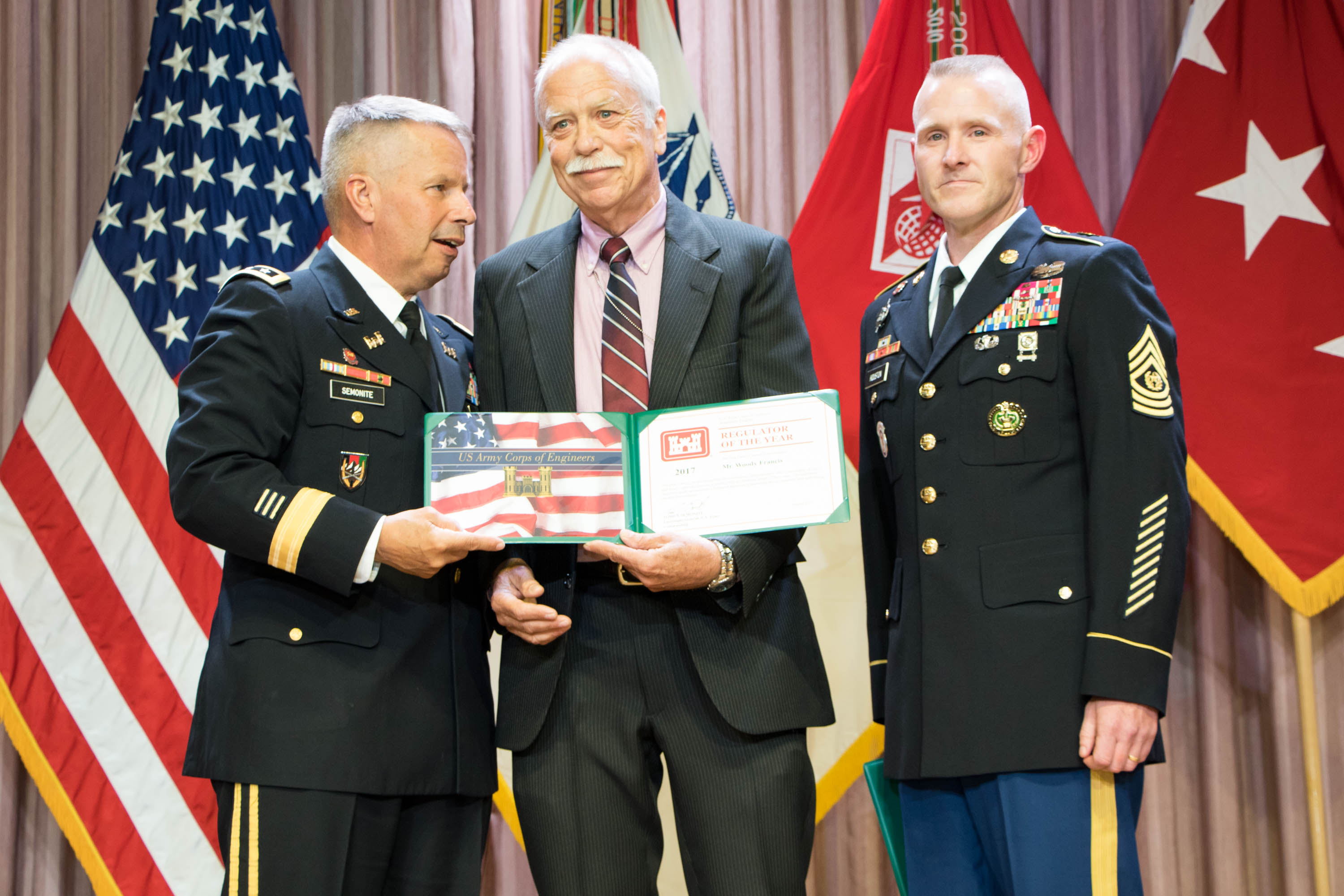In 1974, just after a fishing trip at an inlet in Ocean City, Woody Francis received a notice to interview for a job.
“I’ve had my feet in the water since the age of two,” said Francis. Born and raised in Maryland, Francis has lived with an affinity for the Bay.
Luckily for Francis, the job was with the Regulatory Branch of the U.S. Army Corps of Engineers, Baltimore District — allowing him to keep his feet in the water.
The Regulatory Program in the U.S. was in an uptick at the time, thanks to the Clean Water Act of 1972.
“I had just graduated with a degree in biology that aligned perfectly with this environmental movement,” said Francis.
Forty-two years later, Francis’s entire career has been with Baltimore District’s Regulatory Branch.
Since joining the Corps, he has assisted in the development of the first general permits for the nation and the district in 1976 and worked his way up to become the technical expert for aquaculture activities in Maryland. These aquaculture activities provide $20 million annually in income for Maryland harvesters, processors, distributors and retailers.
“Woody has outstanding skill in managing complex and controversial project permit applications, particularly those concerning aquaculture,” said Dianne Edwardson, Baltimore District, Operations Division chief.
In addition to the aquaculture program, Francis led the review processes and decisions for high-profile permit applications for energy projects affecting Chesapeake Bay like the Calvert Cliffs power plant; and development projects like the last phase of the Ocean Pines development on the Eastern Shore and the Glen Riddle Farm.
It’s his most recent work for the aquaculture program, however, that led him to receive the national Don Lawyer Regulator of the Year Award.
“Oyster aquaculture permitting has been a huge priority for the State of Maryland with a lot of focus from senior leaders, to include Sen. Ben Cardin,” said Col. Ed Chamberlayne, Baltimore District commander. “Woody has been at the center of this and has been responsible for improving our processes in conjunction with our partners. He is very deserving of this award; I am truly proud of him.”
The Don Lawyer award was established by the Corps in 1984 to honor an outstanding non-supervisory regulator who exemplifies superior public service with a commitment to upholding the Corps' Regulatory Mission of protecting aquatic resources while allowing for reasonable development. The Chief of Engineers approves the awardee following a recommendation from the Corps Headquarters Regulatory Program chief after review of a list comprised of a single nominee from each division.

Lt. Gen. Todd T. Semonite, 54th chief of engineers and commanding general of the U.S. Army Corps of Engineers (at left), and Command Sgt. Maj. Bradley Houston, 13th command sergeant major of the Corps, honor Woody Francis, Corps, Baltimore District, Regulatory Branch ecologist, with the Don Lawyer Regulator of the Year Award during the Corps National Awards Ceremony in the District of Columbia, Tuesday, Aug. 1, 2017. (U.S. Army photo by Leanne Bledsoe)
“I was shocked, stunned and humbled when I found out about this award,” said Francis. “I’m just doing my job. I have a great team around me that is owed credit.”
Francis has continued to work with the Maryland Department of Natural Resources and a plethora of other partners to make the aquaculture permitting process more efficient since the program’s inception. He led the way for the 2016 reinstatement of Nationwide Permit #48 with revised regional conditions for aquaculture activities in Maryland and also helped create a concurrent lease/permit review process with DNR.
“Woody led regional efforts to review the diverse aquaculture regulatory programs across the Chesapeake Bay region, provide additional public education initiatives to transparently explain process differences in the region, and implement changes to streamline evaluation of permit applications for aquaculture activities in Maryland waters,” said Beth Bachur, Baltimore District, Regulatory Branch permit process program manager. “These efforts should help enhance the growth of the aquaculture industry and provide alternative economic opportunities for watermen.”
In addition to aquaculture permit process improvement approaches, Francis has worked on non-compliance issues, appropriate marking of projects and fishing gear/pound net concerns in close coordination with federal and state agencies and industry leaders.

Woody Francis, U.S. Army Corps of Engineers, Baltimore District, Regulatory Branch Aquaculture program manager (at left), discusses existing and proposed aquaculture projects on the West, Rhode and South rivers with Benjamin Mazyck, U.S. Coast Guard Station Annapolis, chief of waterways (at right), and Doug Simpson, USCG marine information specialist, aboard the Corps' Survey Vessel Linthicum in Anne Arundel County, Maryland, July 20, 2017. (U.S. Army photo by Sarah Gross)
“He routinely makes objective decisions with emphasis on minimizing aquatic impacts and addressing resource agency concerns while ensuring that the regulated community and their advocates understand the rationalization for reducing impacts to aquatic species, resources and navigation,” said Bachur.
Entering into year 43 with the Baltimore District, it doesn’t appear that Francis plans on slowing down any time soon.
“I love the challenge and diversity that comes with balancing regulatory program demands with meeting customer service demands,” said Francis.
If you ask those who work with him, both internally and externally, they will tell you that he is more than achieving this equilibrium.
“Woody is unwavering in his desire to learn and share his expertise,” said Kathy Anderson, Baltimore District, Regulatory Branch, Southern Maryland Section chief. “He adapts to challenges, guidance and complexities associated with the regulatory program and provides innovative solutions. “It is this that makes him well-regarded not only regionally but nationally in the world of aquaculture.”